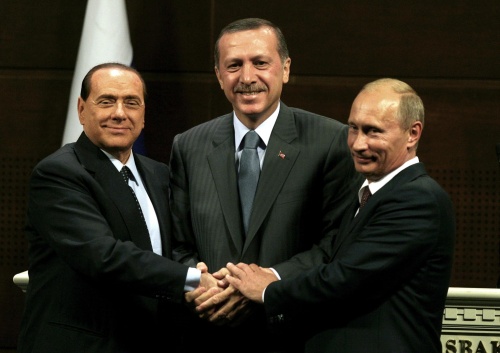
Russia Joins the Samsun-Ceyhan Pipeline
Publication: Eurasia Daily Monitor Volume: 6 Issue: 195
By:

On October 19, Turkey, Italy and Russia signed a memorandum of understanding on the Samsun-Ceyhan oil pipeline (SCP). Turkish Energy Minister Taner Yildiz, the Italian Economic Development Minister Claudio Scajola and the Russian Deputy Prime Minister Igor Sechin, inked the agreement that regulates the commitments of the three partners to the SCP. Despite the several signing ceremonies organized in the past for the SCP, the construction work did not commence. Staging yet another signing ceremony marks Russia joining the project, which is expected to enable the construction work for the SCP to finally begin (ANKA, October 19).
The SCP was developed by Turkey as a bypass route for the transportation of Russian and Kazakh crude to ease pressure on the heavy tanker traffic in the Turkish Straits, which has emerged as one of the world’s major bottlenecks. When completed, the project is estimated to reduce the tanker traffic through the Straits by up to fifty percent. The project is also crucial for Turkey’s plans to turn Ceyhan, which is also the terminus of the Baku-Tbilisi-Ceyhan pipeline, into a worldwide energy terminal.
Russia exports around a quarter of its crude through the Straits, and has had incentives to find alternative routes for the secure and uninterrupted flow of its oil. Nonetheless, despite Turkey’s promotion of the SCP project and its awarding of the license for the construction in 2006, the lack of commitment by producers has hindered the realization of the SCP. Russia viewed such alternatives outside its control as a threat to its dominant position, and pushed for alternative bypass options that would avoid Turkey altogether, such as the Burgas-Alexandroupolis route.
Russia’s position on the SCP changed after the two countries gradually decided to develop a multi-dimensional energy partnership in oil, natural gas and nuclear power. Both countries gave up their previous positions of viewing each other’s flagship projects in competitive terms, and redefined their relations on the basis of mutual interests. The new win-win philosophy underpinning the relationship paved the way for their cooperation in numerous areas (Vatan, August 4; EDM, February 17). As part of the grand energy bargain between Turkey and Russia in the aftermath of Russian Prime Minister Putin’s August 6 visit to Turkey, Moscow decided to join the SCP. In return, Ankara agreed to support Gazprom’s ambitious South Stream project that will pass underneath the Black Sea to compete with the E.U.-backed Nabucco project (EDM, August 7).
The 550-kilometer-long SCP will connect the oil terminal in Samsun on Turkey’s Black Sea coast with the terminal in Ceyhan on its Mediterranean coast, and is estimated to cost approximately $2.5 billion. Initially, it will carry around 1 million barrels per day (bpd), and later its capacity will be increased to 1.5 million bpd. In addition to the pipeline, the project also involves the construction of a docking terminal in Samsun and storage facilities in Ceyhan (ANKA, October 19).
The project will be carried out by the Trans-Anatolian Pipeline Company (TAPCO), a joint enterprise of the Turkish company Calik Energy and the Italian energy company ENI, each controlling a 50 percent stake. The Russian Transneft and Rusneft will provide the crude for the pipeline. Sechin added that the two companies might also assume a role in the construction of the pipeline in the future or join the pipeline as partners. It was also suggested in the Turkish press that the Russian oil company Lukoil, which has also started its operations in Turkey, has expressed its willingness to use the pipeline. ENI’s CEO Paolo Scaroni emphasized that they were considering carrying Kazakh crude through the SCP (Cihan, October 19).
In a related development complementing the Turkish-Russian-Italian partnership, Ankara gave the go-ahead for geological exploration in its Black Sea economic zone as part of the South Stream project, a joint venture between Gazprom and ENI. According to a statement issued by the Kremlin, President Abdullah Gul telephoned his Russian counterpart Dmitry Medvedev and said that the Turkish government had made the necessary legal preparations to grant permission (Anadolu Ajansi, August 20).
The Turkish government has prided itself in the conclusion of such spectacular projects, which in its view will elevate Turkey to the status of a major regional and global energy hub. However, the questions as to who benefits from these ventures and the conditions under which such business deals are conducted have become growing domestic issues. Critics of the government have accused it of awarding these contracts to its “cronies” in a non-transparent manner. The ties between government figures and the Turkish partner of the SCP, Calik group, have proven to be the major source of criticism. Calik group, whose CEO Berat Albayrak is Prime Minister Recep Tayyip Erdogan’s son-in-law, was awarded the construction of the SCP through a cabinet decision without a public tender in 2006. The critics also add that the government granted the Calik group permission to build the storage facilitates in Ceyhan through controversial transactions (Birgun, September 9, 2008).
The main opposition Republican People’s Party even raised the issue in parliament, requesting a parliamentary inquiry into the government’s dealings with the Calik group in the SCP, as well as on recent international energy deals. CHP representatives claim that in order to promote the interests of the pro-government business community, the government has deepened the country’s dependence on imported fossil fuels, and postponed the development of domestic renewable energy resources (Taraf, August 18).
The Calik group has defended itself by arguing that their project was financed fully by the private sector and it required only the awarding of a license rather than a public tender. Calik group also maintains that other pipelines were built according to the same practices (Hurriyet, May 15, 2006). Nonetheless, critics still insist that the prime minister has been lobbying on Calik’s behalf to solicit Russian participation in the SCP. Moreover, they claim that the economic stimulus package that the government launched this summer, which would provide financial incentives for infrastructure investments by the private sector, contained clauses favoring the interests of the Calik group (www.sol.org.tr, October 20).




